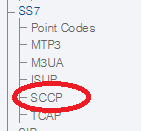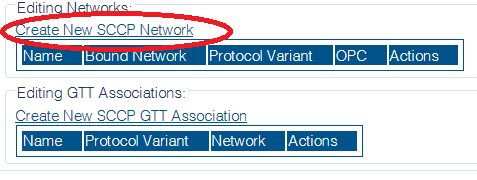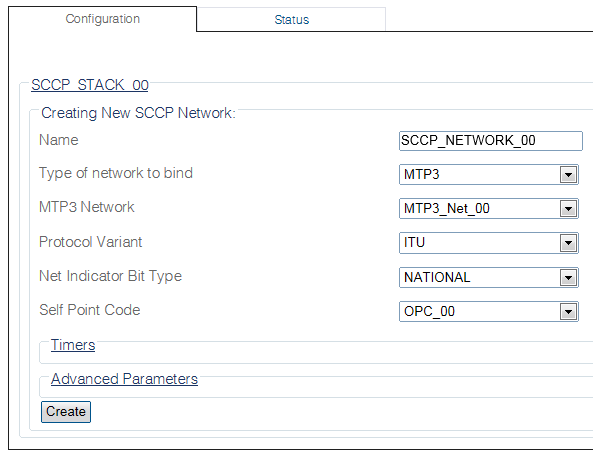Toolpack:Creating an SCCP Network C
From TBwiki
(Difference between revisions)
m |
|||
| (One intermediate revision by one user not shown) | |||
| Line 1: | Line 1: | ||
| − | |||
{{DISPLAYTITLE:Creating an SCCP Network}} | {{DISPLAYTITLE:Creating an SCCP Network}} | ||
| + | {| class="wikitable" | ||
| + | |- | ||
| + | |rowspan="3"|This article applies to: | ||
| + | |'''Product''' | ||
| + | |'''Version''' | ||
| + | |- | ||
| + | |Tmedia | ||
| + | |2.9, 2.10, 3.0, 3.2 | ||
| + | |} | ||
| + | |||
After you create the initial SCCP stack, you must create a new SCCP network for your system. | After you create the initial SCCP stack, you must create a new SCCP network for your system. | ||
| − | The [[SCCP]] network | + | The [[SCCP]] network informs the SCCP protocol layer about a collection of SS7 nodes that are accessible through MTP3. |
Based upon your system configuration, one or more SCCP networks are created. Repeat this section for as many networks as you require. | Based upon your system configuration, one or more SCCP networks are created. Repeat this section for as many networks as you require. | ||
Latest revision as of 13:41, 9 December 2020
| This article applies to: | Product | Version |
| Tmedia | 2.9, 2.10, 3.0, 3.2 |
After you create the initial SCCP stack, you must create a new SCCP network for your system.
The SCCP network informs the SCCP protocol layer about a collection of SS7 nodes that are accessible through MTP3. Based upon your system configuration, one or more SCCP networks are created. Repeat this section for as many networks as you require.
To create an SCCP network:
1- Select SCCP from the navigation panel
2- Click Create New SCCP Network in the SCCP stack configuration window
3- Configure the new SCCP network:
- Provide a Name for the SCCP network
- Select an MTP3 Network on which to bind the SCCP stack
- Select an SCCP Protocol Variant
- Select an SCCP Net Indicator Bit
- Select a Self Point Code
- Click Create
4- Verify that the "SCCP Network was successfully created" message appears
Path
/configurations/@[configuration_name]/sccp_stacks/@[sccp_stack]/sccp_networks/@[sccp_network]
Parameters (text)
/configurations/@[configuration_name]/sccp_stacks/@[sccp_stack]/sccp_networks/@[sccp_network] m3ua_userpart = "" mtp3_network = "@[mtp3_network]" name = "@[sccp_network]" net_indicator_bit_type = "NATIONAL" protocol_variant = "ITU" self_point_code = "XTEL_OPC_2106" type_of_network_to_bind = "MTP3" /configurations/@[configuration_name]/sccp_stacks/@[sccp_stack]/sccp_networks/@[sccp_network]/advanced_parameters default_hop_count = 10 msg_importance_for_priority_0 = 6 msg_importance_for_priority_1 = 6 msg_importance_for_priority_2 = 6 msg_importance_for_priority_3 = 6 use_sio_priorities_msg_importance_mapping = false /configurations/@[configuration_name]/sccp_stacks/@[sccp_stack]/sccp_networks/@[sccp_network]/timers asmb_timer = "30 seconds" attack_timer = "100 milliseconds" congestion_timer = "1 second" crd_timer = "1 minute" decay_timer = "1 second" ignore_sst_timer = "30 seconds" srt_timer = "30 seconds" sst_timer = "30 seconds"
Parameters (json)
{
"advanced_parameters" : {
"default_hop_count" : 10,
"msg_importance_for_priority_0" : 6,
"msg_importance_for_priority_1" : 6,
"msg_importance_for_priority_2" : 6,
"msg_importance_for_priority_3" : 6,
"use_sio_priorities_msg_importance_mapping" : false
},
"m3ua_userpart" : "",
"mtp3_network" : "@[mtp3_network]",
"name" : "@[sccp_network]",
"net_indicator_bit_type" : "NATIONAL",
"protocol_variant" : "ITU",
"self_point_code" : "XTEL_OPC_2106",
"timers" : {
"asmb_timer" : "30 seconds",
"attack_timer" : "100 milliseconds",
"congestion_timer" : "1 second",
"crd_timer" : "1 minute",
"decay_timer" : "1 second",
"ignore_sst_timer" : "30 seconds",
"srt_timer" : "30 seconds",
"sst_timer" : "30 seconds"
}
}
List of Parameters
- Name
- Type of network to bind
- MTP3 Network
- SCCP Protocol Variant
- SCCP Net Indicator Bit
- Self Point Code
Timers
Advance Parameters


